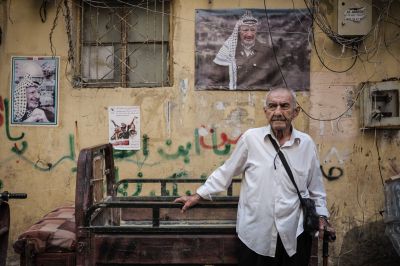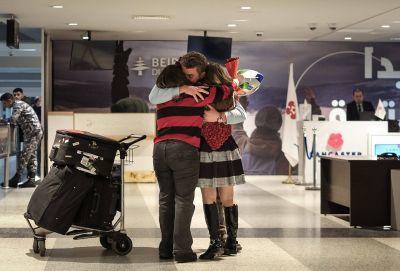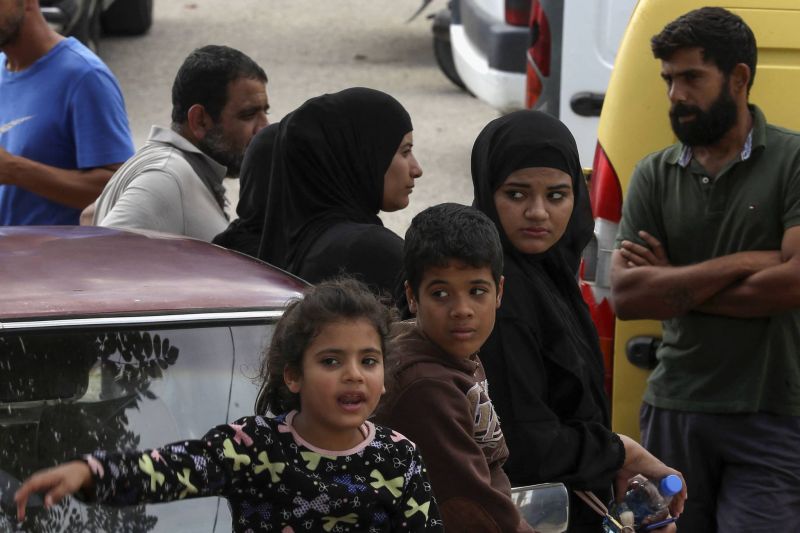
Displaced Lebanese from villages near the southern border take refuge at a school in Sour city, on Oct. 19, 2023, as they sought safety further from the intensifying border tensions between Israel on one side and Hezbollah and allied Palestinian factions on the other over Israel's war with Hamas. (Credit: Mahmoud Zayyat/AFP)
BEIRUT/SAIDA — Last week, Nana Salameh decided she’d had enough. Originally from Jdeidet Marjeyoun, a village in the southern Nabatieh governorate, the graduate student moved north to Beirut.
Salameh’s house in Beirut is a sanctuary, a place her family bought after their original homes and lands were seized during the 1978 South Lebanon conflict. At the time, Israel invaded southern Lebanon in response to a Palestinian militant attack near Tel Aviv.
After the Israeli army finally withdrew in 2000, the family returned, renovated and resettled in their original homes, turning Beirut, once again, into a backup destination.
But Salameh’s house in Jdeidet Marjeyoun is a mere 15-minute drive from the Blue Line, a UN-delineated border between southern Lebanon and Israel.
“There is no safety,” Salameh tells L’Orient Today. “We are constantly living in fear because Israel is treacherous.” Already, Israeli shelling has killed at least five civilians in the area, including a Reuters journalist and an elderly couple who had stayed in their house in Shebaa, southern Lebanon.
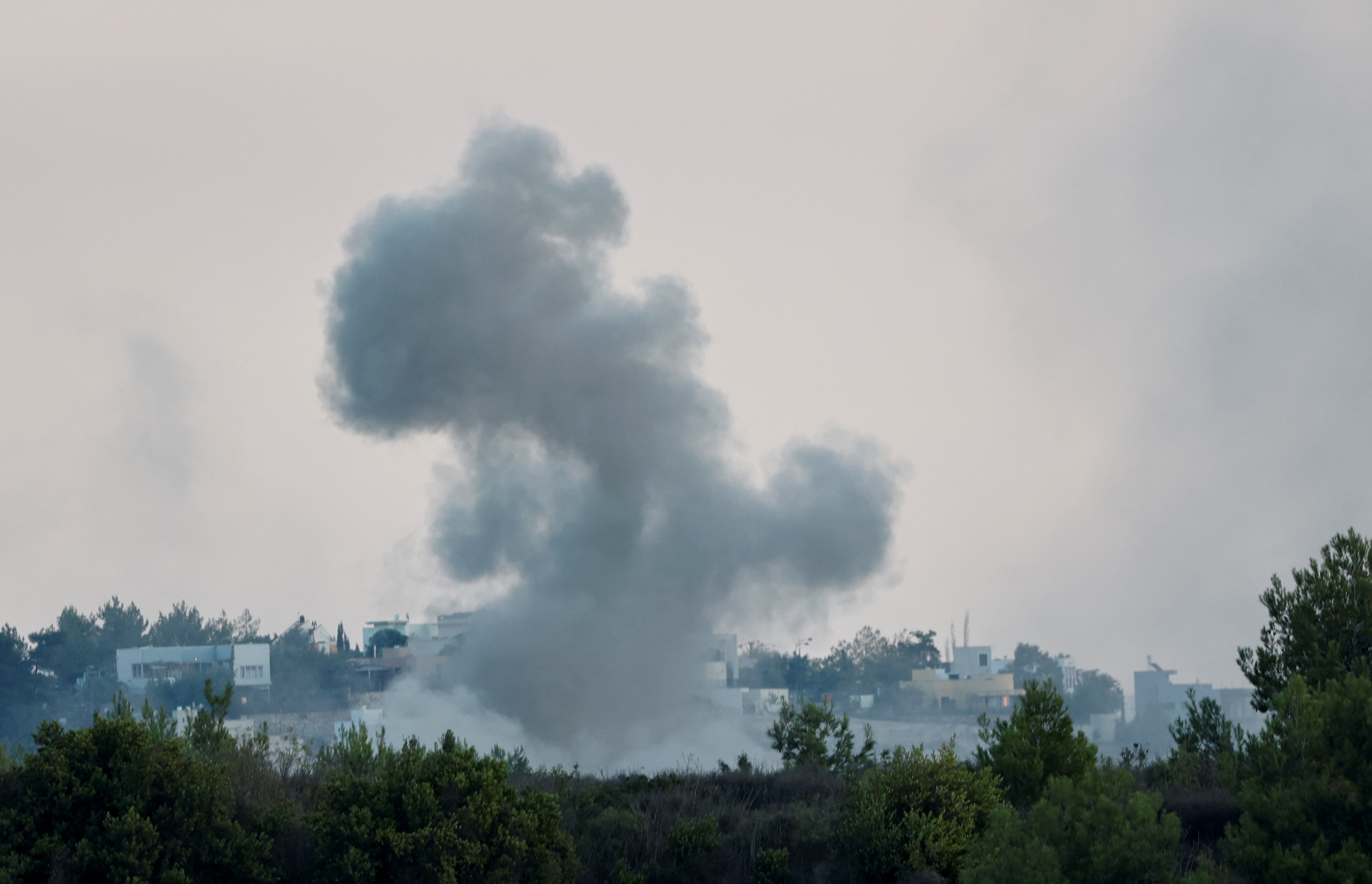 Smoke rises after Israeli shelling , as seen from Lebanese side, near the border with Israel, in Alma al-Shaab, southern Lebanon, Oct. 13, 2023. (Credit: Thaier Al-Sudani/Reuters)
Smoke rises after Israeli shelling , as seen from Lebanese side, near the border with Israel, in Alma al-Shaab, southern Lebanon, Oct. 13, 2023. (Credit: Thaier Al-Sudani/Reuters)
She isn’t alone — in the past two weeks, “almost 13k people have already fled their homes in the South of Lebanon and the number is rising rapidly,” Jacob Boswall, Team Leader of Lebanon Crisis Analytics Team (LCAT) at Mercy Corps, posted on X Friday, citing data from the UN’s International Organization for Migration.
The districts of Beirut, Saida and Aley have received the biggest number of displaced people, ranging between 1,501 and 2,500, according to IOM’s report, seen by L’Orient Today.
Families are streaming to areas they deem to be a safer distance from the border, as militants exchange fire with Israeli forces and raise the risk of a bigger conflict enveloping the area.
“These skirmishes always happen, but now they are more intense because of the war in Gaza,” Salameh says.
She says that when she was in southern Lebanon before her move to Beirut, she saw Israeli forces dumping white phosphorus bombs that led to “dispersed fires in nearby bushes.” Human Rights Watch also confirmed Israel’s use in recent days of internationally-banned white phosphorus in both Gaza and southern Lebanon by analyzing videos.
“They were very close to us,” Salameh tells L’Orient Today.
She says she keeps an emergency bag with her passport, cash and important documents “at the door at all times.” She also keeps her car always filled with gasoline.
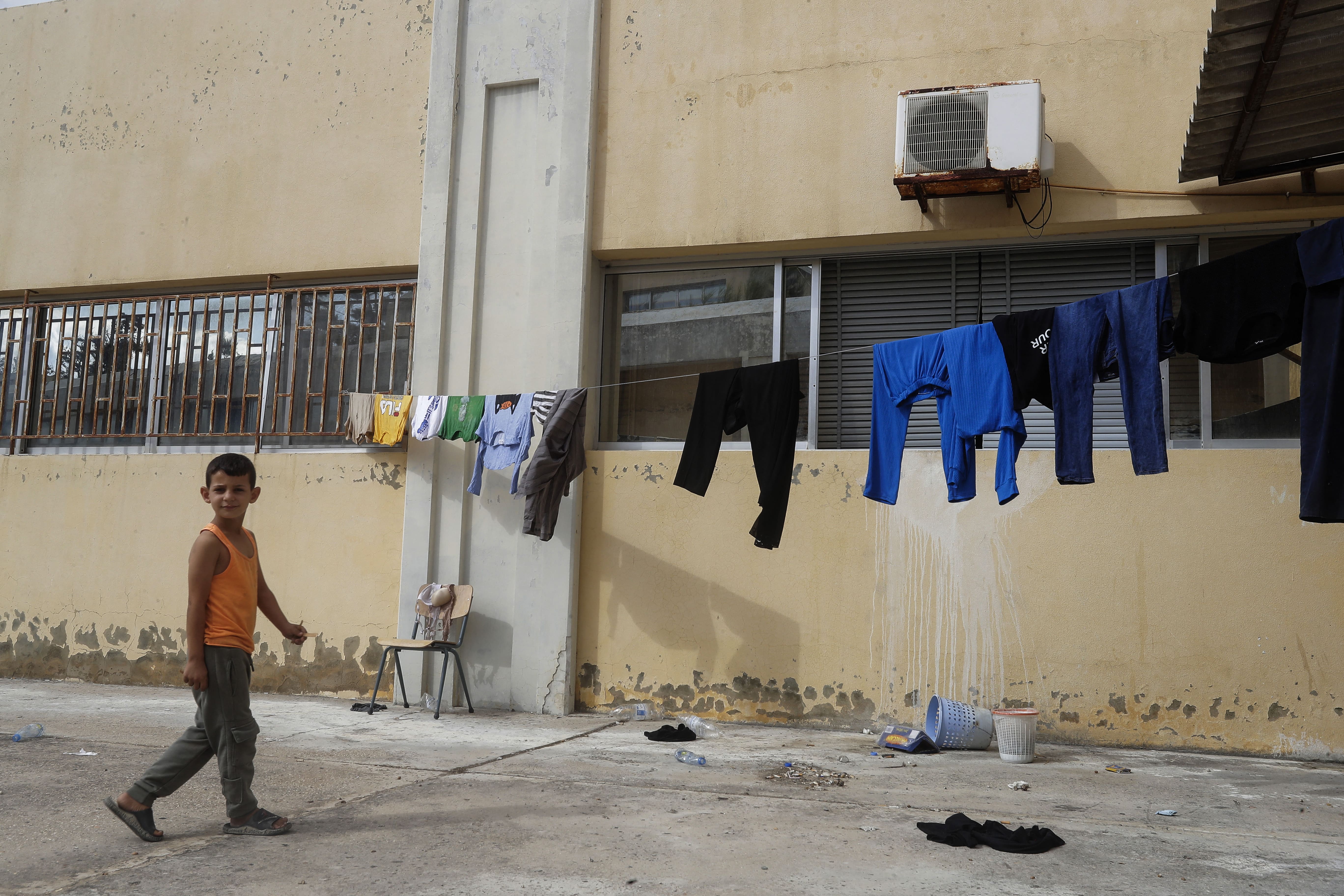 A boy walks in the yard of a school where displaced Lebanese families from villages near the southern border took refuge in Sour city, on Oct. 19, 2023, as they sought safety further from the intensifying border tensions between Israel on one side and Hezbollah and allied Palestinian factions on the other over Israel's war with Hamas. (Credit: Mahmoud Zayyat/AFP)
A boy walks in the yard of a school where displaced Lebanese families from villages near the southern border took refuge in Sour city, on Oct. 19, 2023, as they sought safety further from the intensifying border tensions between Israel on one side and Hezbollah and allied Palestinian factions on the other over Israel's war with Hamas. (Credit: Mahmoud Zayyat/AFP)
Salameh checks on her sister and other family members multiple times every day.
“My sister and her husband operate convenience shops in Jdeidet Marjeyoun so they had to stay behind in the south,” she says.
“But she, my cousins, and all my relatives remain ready and alert to move to Beirut,” if a conflict arises, “and if any of our neighbors need a place in Beirut, we plan to receive them in our homes.”
‘I can’t afford to be stuck in Aramoun’
Yumun Itani works as a staff nurse in the recovery room at the American University of Beirut Medical Center, where victims from disaster zones arrive for immediate care during crises.
She lives in the town of Aramoun, around half an hour southeast of Beirut, and has decided to move, along with her husband and two daughters, into her brother’s apartment in the capital.
Still reeling from the aftermath of the Aug. 4, 2020 Beirut port explosion as well as the layoff of more than 800 employees at the AUB hospital, which has added to her workload, “I can visualize the scenario that awaits me at work in case of war,” she says.
“I am the oldest one at work, and it’s important for me to be there.” A war with Israel would make commuting from her house in Aramoun to Beirut complicated, or potentially even perilous.
She says the hospital has a well-structured disaster code, launched when large-scale emergencies begin to unfold. During these crises, the presence of all staff members, particularly in departments like Itani's recovery room, is non-negotiable.
 Members of the Lebanese fishermen's syndicate and Palestinian workers wave flags during a symbolic parade against Gaza's sea blockade by Israel, in southern Lebanese city of Saida on Oct. 20, 2023, amid ongoing battles between Israel and the Palestinian Hamas movement. (Credit: Joseph Eid/AFP)
Members of the Lebanese fishermen's syndicate and Palestinian workers wave flags during a symbolic parade against Gaza's sea blockade by Israel, in southern Lebanese city of Saida on Oct. 20, 2023, amid ongoing battles between Israel and the Palestinian Hamas movement. (Credit: Joseph Eid/AFP)
“So I can’t afford to be stuck in Aramoun when the wounded flood our emergency room,” she explains.
Meanwhile, her husband, who works with the Internal Security Forces (ISF) in Beirut, and who was assigned intermittent night patrol shifts due to the escalating tensions, also needs to be close to work.
The family is now staying with Itani’s brother in Beirut’s Clemenceau neighborhood, only a five-minute commute from the hospital and her husband's duty station in Sanayeh.
Shoppers, municipal officials prepare for the worst
Other families are seeking temporary homes in Saida due to its relative distance from the scene of the border clashes.
There, municipal officials tell L’Orient Today they’ve held multiple meetings with government agencies and civil society groups to discuss plans for accommodating and assisting displaced people in the event of an Israeli aggression.
Officials say they’ve approved ambulances, fire and rescue services as well as several schools to stand in as potential shelters for the displaced, with logistics support from the Red Cross and the Islamic Health Authority.
Despite the heightened tensions at the border, shops and supermarkets in the south have yet to see a significant surge in food stockpiling.
Ahmed, an employee at a Spinneys branch in Saida, says that shopping activity has remained normal — “we have not seen extraordinary customer demand yet,” he tells L’Orient Today in between stacking items on shelves.
Pushing her shopping cart down an aisle, Amal has only one Kleenex box, a ketchup bottle and a block of cheese.
“We don't need to store supplies. The situation will calm down,” she insists.
Samira, on the other hand, pushes a cart full of food supplies. Standing in front of the cashier, she tells L’Orient Today, “I usually buy [groceries] in large quantities, but this time I increased it a bit more.”
“Instead of buying one of each item, I bought two. But this is not stockpiling. It is a precautionary method.”
However, some stores have witnessed increased wholesale purchases, particularly of grains and canned goods, as merchants prepare for potential market disruptions “in order to possibly profit later,” Mohamed al-Bikai, the director of the Al-Bikai Trading Establishment in Saida, tells L’Orient Today.
Bikai owns several stores in the city that sell foodstuffs.
Living in Rmeileh, several kilometers north of Saida, Bikai himself has also stocked up on meat, chicken and canned food for his household, because “in the event of a war, the bridges may be cut off and we will no longer be able to move around, as happened in the July 2006 war.”
‘As if you’re emigrating’
Hasan Jaber, who moved to Beirut from southern Lebanon last week following the tension at the border, has family members and neighbors either scouting out or renting apartments at Mount Lebanon’s Keserouan and Metn districts.
He says apartments and chalets are in high demand now due to the war, and rent out quickly.
Just last weekend, Jaber says he checked on multiple apartments merely hours after speaking with the landlords, only to find the properties already rented out.
He is from Touline, a village in the Nabatieh governorate, where bombardments happening at the border are “often clearly heard,” he says.
His seven-months-pregnant sister, who used to live in the nearby village of Tibnin, has also moved north. She is now staying at a family house in Beirut, hoping it will be safer for her and her baby in case of escalation.
“We heard all the shellings that took place in Khiam, despite those areas being a bit far from Touline and Tibnin,” Jaber says.
Jaber’s extended family is trying to secure housing in the mountains, though they remain worried. If Israeli forces do decide to strike areas further north of the border zone, “we can never know where they would hit,” he says.
The ordeal of scouting for a house in the mountains has also come with challenges.
Jaber said there are landlords in the mountains who know he and others fled the south out of fear and “are taking advantage of the situation and raising the rent.”
His sister, a real estate agent, says she knew about an available fully-furnished apartment in Deir al-Qamar, in the Chouf region, whose landlord had previously been asking for $500 a month, including water and electricity bills.
“Now he’s asking for $2,000,” Jaber says.
Meanwhile, like Salameh, Jaber has pre-packed a bag with passports, cash, official papers, birth certificates, house documents, civil registry transcripts and university certificates.
“You need to treat the situation as if you’re emigrating.”
Additional reporting by Muntasser Abdallah
